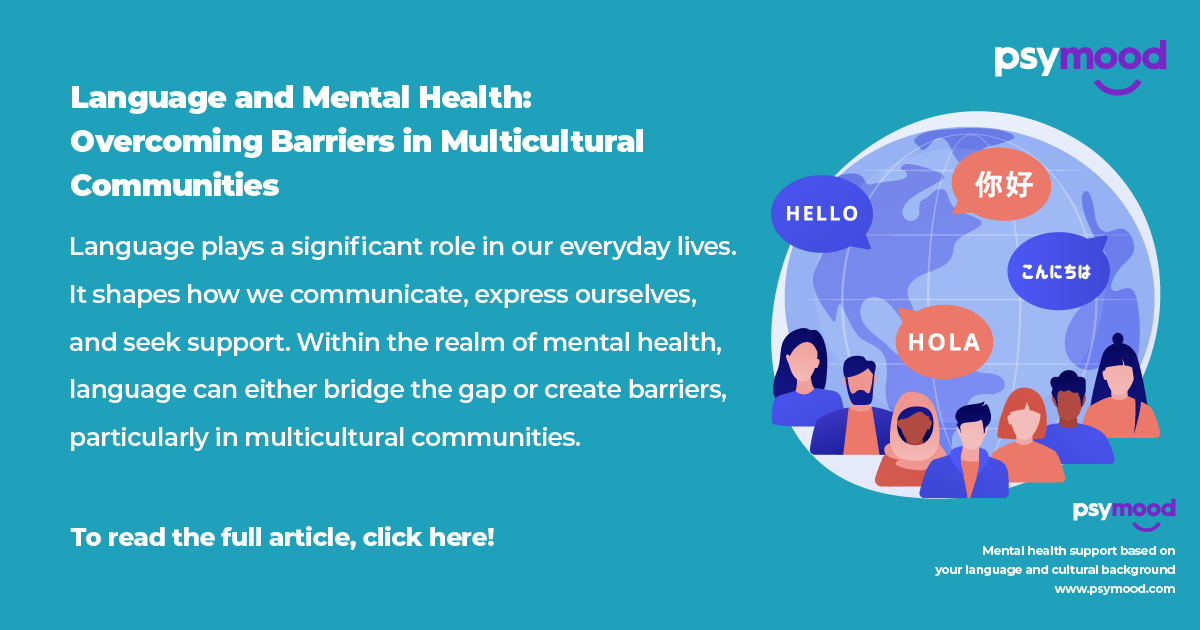Language and Mental Health: Overcoming Barriers in Multicultural Communities
Language plays a significant role in our everyday lives. It shapes how we communicate, express ourselves, and seek support. Within the realm of mental health, language can either bridge the gap or create barriers, particularly in multicultural communities. In today’s blog, we will explore the intersection of language and mental health, the barriers faced by individuals with limited English proficiency and the importance of overcoming these challenges to ensure equitable access to mental health services.
Language Barriers: Hindrances to Mental Health Support
Let’s start by delving into the various language barriers that can impede individuals from accessing and receiving adequate mental health support. Limited proficiency in the dominant language of a country can lead to difficulties in understanding and articulating emotional distress, exacerbating feelings of isolation and hindering help-seeking behaviour. Moreover, cultural nuances, idiomatic expressions, and lack of language support in mental healthcare settings can contribute to these barriers. We need to readily have mental health support available to everyone who needs it. A language barrier should not create more barriers.
Impact on Help-Seeking and Mental Health Outcomes
Now let’s talk about the consequences of language barriers on help-seeking behaviour and mental health outcomes. Individuals facing language challenges may be less likely to reach out for professional assistance, resulting in delayed or inadequate support. Some of the potential effects on mental well-being include increased distress, reduced treatment adherence, and limited access to culturally competent care. My parents experienced this when they came to Canada 25 years ago. Being away from their family back home caused a lot of distress in their life but finding someone to talk to was difficult. Their only options were to find people through their community who spoke their language. This is not a unique experience, every day, thousands of newcomers face mental health struggles and often don’t know where to go to seek help.
Breaking Down Language Barriers: Strategies and Solutions
Now we can look at effective strategies to overcome language barriers in mental health services. Let’s look at the importance of professional interpreters and culturally sensitive translators who can bridge the linguistic gap and facilitate effective communication.
Having professional interpreters and culturally sensitive translators in mental health services is of paramount importance for several reasons. Firstly, communication is vital in mental health settings to ensure that individuals can express their thoughts, emotions, and experiences accurately. Secondly, language should never be a barrier to accessing the support one needs. Mental health services need to become more inclusive and accessible to individuals with limited English proficiency to ensure that everyone has equal access to quality mental health.
Advocacy and Empowerment: The Way Forward
While progress has been made, we need to acknowledge the challenges that persist for 2SLGBTQ+ mental health. We need to shed light on the disparities in access to mental health services, the continued stigma faced by many, and the need for culturally competent and affirming care. The future of mental health needs to move towards a reality where we can provide affirming care to everyone and individuals who face multiple forms of discrimination and marginalization can access proper care.
PsyMood is a digital tool designed to help you find the support you need in the language that you are most comfortable with. PsyMood considers cultural background, geographical location, interests, and personal needs, amongst other factors, to pair you with service providers for either online or in-person therapy sessions.
For More Interesting Posts
You may also be interested in learning more about Invisible Crisis on the Transgender Community – Session Highlights, Five Ways to support and Celebrate PRIDE this June, Being queer, and How it affects my mental health


.png)
.png)
.png)
Recent Comments